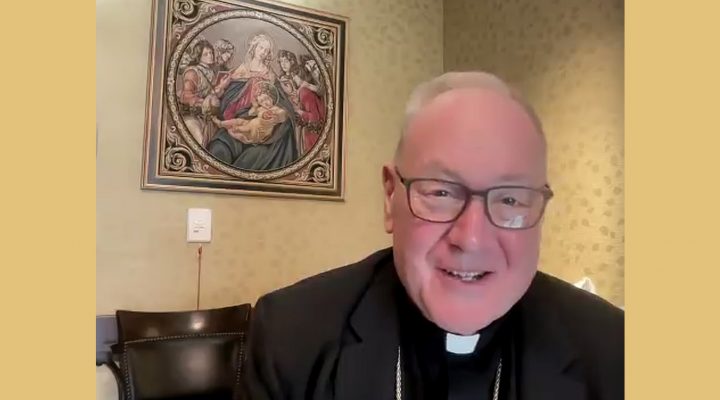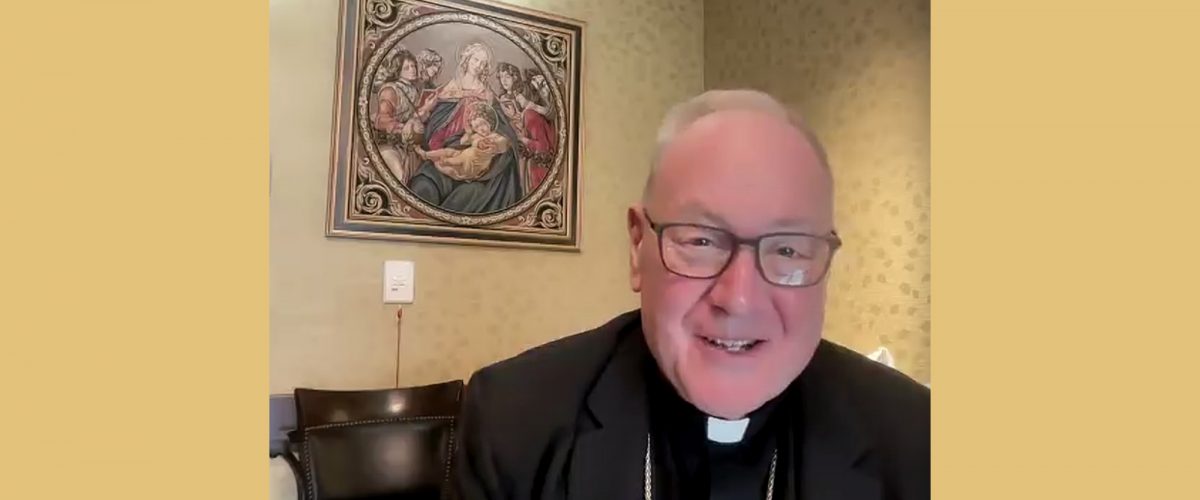Bridging the seething partisan divide over U.S. immigration policy will require a separation of the political from the pastoral aspects of the crisis, said Cardinal Timothy Dolan, archbishop of the Catholic Archdiocese of New York.
And that starts with a recognition that the biblical imperative to welcome the stranger is not at odds with need for strong border security, Dolan said during a webinar hosted recently by the Center for Migration Studies.
“I’m a believer in a God who has revealed a lot about the human person and the sacredness of human life and the dignity of every human person,” he said. “And I’m a believer in the Judeo-Christian tradition thatnconsiders it a moral imperative to welcome the immigrant and to protect them and to further their cause.”
While a “secure and safe” immigration policy is necessary, it should not come at the expense of the well-being of the nation’s soul and character, he asserted. “As an American, it means a lot to me that our legacy is damaged and compromised when we are not a nation that fairly, equitably and safely welcomes immigrants.”
“Our legacy is damaged and compromised when we are not a nation that fairly, equitably and safely welcomes immigrants.”
Dolan was joined in a panel discussion by Nicholas DiMarzio, bishop emeritus of Brooklyn, and Kerry Robinson, president of Catholic Charities USA. The webinar was moderated by Mario Russell, executive director of the Center for Migration Studies.
Their conversation touched on congressional Republican efforts to severely restrict asylum rights and on rising criticism of Catholic Charities for its longtime ministry to immigrants at the border and throughout the country.
Sinister rhetoric
Panelists also slammed conservatives’ use of increasingly sinister anti-immigrant rhetoric, including Donald Trump’s recent claim that immigration is “poisoning the blood” of the nation.
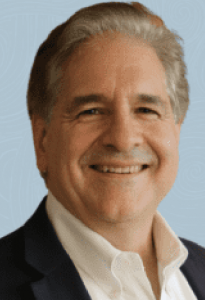
Mario Russell
“Demeaning, derogatory and dehumanizing rhetoric stirs nothing but fear, difference and division,” Russell said. “There is in the public discourse the language of ‘poisoning our blood,’ invasion, subversion — all on the shoulders of migrants. This is powerful rhetoric, and it is rhetoric that is inevitably followed by policies that are only designed to exclude and expel people.”
A case in point, he said, is the current attempt by Republicans in the U.S. Senate to insert drastic asylum restrictions into an international aid bill requested by President Biden to help Ukraine and other allies.
“Legislators are working basically a one-way compromise that trades foreign security with the rights and the dignity of migrants, in effect intentionally labeling migrants as border security threats,” Russell said. “What that really means is radical changes in the asylum standards and eligibility, extending expedited deportation, mandatory detention of asylum seekers and border exclusions and closures by fiat.”
“Too little is said about a way toward rational, humane solutions that balance sovereignty issues with economic needs.”
Lost in the process are needs of those fleeing persecution and the benefits immigrants offer the American workforce, Russell countered. “The security that is being traded now is human security and too little is said about a way toward rational, humane solutions that balance sovereignty issues with economic needs.”
Catholic Charities
A small but loud group of politically motivated critics has turned that demonizing rhetoric toward Catholic Charities in recent months, Robinson noted. Accusing the organization of being partisan for its ministry to immigrants, some Republicans in Congress have sought to cut U.S. funding for its respite centers at the border.
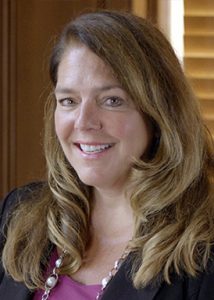
Kerry Robinson
“The important fact is this: Catholic Charities is not a political organization, but a faith-based humanitarian network,” she said. “Catholic Charities agencies have been living out the gospel, feeding the hungry and welcoming the stranger. It has been providing these services for more than a century.”
Overlooked in the criticism is that the organization cooperates with state, local and federal agencies and serves a wide range of clients, she added. “Imagine a family whose home was demolished in an instant by a tornado, an expectant mother unsure how to care for a newborn, a veteran looking to develop new skills, a senior barely able to afford medication, a person in recovery struggling with depression, a family materially impoverished, hungry, living out of their car. The people we serve all have one thing in common: they need help, they yearn for mercy, they need compassion.”
“It comes from people who are either woefully misinformed or, worse, misrepresent our work for partisan reasons.”
Nevertheless, political vitriol toward Catholic Charities will rise during the coming election season, she predicted. “It comes from people who are either woefully misinformed or, worse, misrepresent our work for partisan reasons.”
Immigrants also will become bigger targets as the election nears, she said. “It’s easy to lose sight of the fact that we are speaking about human beings just like us, with names and compelling stories and compelling hopes, especially on behalf of their children.”
Compromise impossible
The U.S. immigration situation clearly results from such brokenness in the relationship between the Republican and Democratic parties that any compromise is impossible, said DiMarzio, a board member with both the Center for Migration Studies and the Catholic Legal Immigration Network.
As a result, Republican immigration amendments to the president’s foreign aid legislation would, if Biden relents, give conservatives a one-sided victory because they omit pathways to citizenship for Dreamers and for Afghan and other refugees currently in the U.S. on temporary parole.
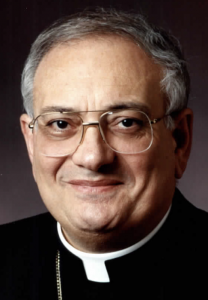
Anthony DiMarzio
“We don’t see any positives coming out of it,” DiMarzo said. “What we need to do is convince our lawmakers to be more positive on the contribution immigrants make to our nation. We are in a labor shortage in many places. This is why we need immigrants. We need them for the benefit of the country.”
Urging Americans to learn about U.S. immigration history could help change present-day attitudes about immigration, he said.
DiMarzio said he is frequently asked why immigrants don’t enter the country legally like their ancestors did. “Well, people don’t know the history of immigration in our country. Until 1922, almost anybody could come. There were few restrictions. They just had to be healthy, willing to work and get through Ellis Island or one of the other ports of entry.”
But that changed as prejudicial attitudes swelled against immigrants, especially those from Southern and Eastern European countries, he explained. “So, our history has been up and down. It’s been 100 years since we saw that terrible blot on our immigration history, and I think we’re going to recreate that again if we don’t wake up to realize we are using language that is terribly dehumanizing toward newcomers.”
Conviction by experience
Dolan said his own immigrant heritage has fueled his calling to serve and immigrants.
“I have a duty and a sacred responsibility to welcome and defend the immigrant.”
“I am the grandchild of immigrants who happened to be from Ireland. That was an important part of growing up. I could remember hearing my own grandparents speak about their love for America and speak about the welcome that they received, but also about some of the animosity and resistance they and their ancestors received here in the United States.”
But support for compassionate immigration reform is also to be found in religious freedom, said Dolan, chairman of the Committee on Religious Liberty for the U.S. Conference of Catholic Bishops.
“I have a duty and a sacred responsibility to welcome and defend the immigrant. This is not some option,” he said. “This is not some hobby. I have a duty to do that, and the Constitution of the country that I love allows me the free exercise of my religion.”
Dolan added that welcoming the stranger is not only a right but a mandate for people of faith.
“When I hear bigots in our Congress suggest that we’re the ones who are not patriotic and un-American, I’m saying, ‘Have you ever read the First Amendment? The Bill of Rights?’ It is a moral imperative for every Jew, for every Christian and for every member of the Islamic faith to rise to the welcome of the immigrant. That is part of our moral heritage.”
Related articles:
Immigration advocates deplore House Republicans’ effort to tie Ukraine aid to severe border measures
Most Americans see immigration as a good thing, but Republicans disagree
Evangelical Immigration Table urges Congress to consider what Jesus would do

